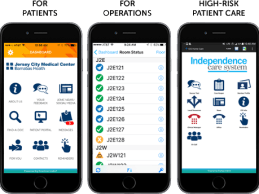Harris Computer Systems ("Harris"), today announced it has acquired Uniphy Health, an enterprise clinical communication, and collaboration platform through its Healthcare group. The acquisition will help extend Harris’ suite of clinical solutions in the acute and post-acute care settings to offer new ways to improve care coordination, physician and patient engagement.Uniphy Health BackgroundFounded in 2013, Uniphy Health is a secure and HIPAA-compliant clinical communication platform built for
Read More
Care Coordination| Clinical Communication News, Analysis, Insights - HIT Consultant
Kaiser Permanente Launches EHR Integrated Social Health Network to Address SDoH
Kaiser Permanente is partnering with social coordination platform Unite Us to launch a comprehensive health network called Thrive Local. The social health network will connect healthcare and social services providers to address the pressing social needs including housing, food, safety, utilities and more for millions of people across the United States.In addition to being integrated into Kaiser Permanente's Epic electronic health record (EHR) system to comprehensively serve its members, Thrive
Read More
Physician Practices Strategy to Developing A Strong Chronic Care Management (CCM) Program
More than three years have passed since the Centers for Medicare & Medicaid Services (CMS) introduced its separately billable non-face-to-face Chronic Care Management (CCM) service. This was intended to help more than two-thirds of individuals on Medicare who suffer from multiple conditions receive more coordinated, regular primary care. The hope was that a focus on managing chronic conditions would contribute to better outcomes for overall population health, improve individual access to
Read More
AzHHA Taps PatientPing to Improve Care Coordination Across State of Arizona
The Arizona Hospital and Healthcare Association (AzHHA) announced a new partnership with PatientPing, a comprehensive care coordination platform, to improve patient care outcomes across the state of Arizona. The statewide partnership, coordinated through AzHHA's Affiliated Partners Program, will connect all of AzHHA's member hospitals and participating providers. Participants will have access to real-time patient information and insights from care events across the entire continuum, enabling
Read More
Why 2018 May Have Been A High-Water Mark for Digital Health Funding
Notwithstanding the quite significant stock market turmoil for publicly traded healthcare companies in recent months, the level of private investment activity continued to be quite strong this past quarter. According to Rock Health, 1Q19 registered just under $1.0 billion of investments made in 61 healthcare technology companies, which while below the trailing two year quarterly average of $1.4 billion, still suggests an annual investment pace running toward $4.0 billion. StartUp Health, which
Read More
UnitedHealthcare Tech Accelerator Appoints Matt Miller as Managing Director
Today, UnitedHealthcare and Techstars opened applications for the UnitedHealthcare Accelerator Powered by Techstars, which just launched in Minneapolis to collaboratively develop innovations in digital health and wellness. The program will focus on digital health and wellness solutions that help support and enhance the experience of UnitedHealthcare members.UnitedHealthcare Tech Accelerator Application Criteria & DeadlineApplications for the inaugural class are open through May 12, 2019. The
Read More
InterSystems Unveils New HealthShare Provider Directory with Unified Care Record
InterSystems has announced the 2019.1 version of the HealthShare® product suite of connected health solutions. The newest member of the suite is the HealthShare Provider Directory, which offers a single source of truth for provider demographic and professional relationship information.Impact of Inaccurate Provider InformationInaccurate provider information has consequences – for patients, payers, and the providers themselves. Wrong telephone numbers and location information limits access to
Read More
Cityblock Raises $65M to Address Social Determinants of Health in Underserved Communities
Cityblock, a Brooklyn, NY-based company building sustainable, scalable systems that provide high-quality, cost-effective care for underserved populations with complex health needs has raised $65 million in Series B funding. The funding was led by Redpoint Ventures, 8VC (affiliate venture fund with Cambia Health Solutions and Blue Cross and Blue Shield of North Carolina), Echo Health Ventures and StartUp Health including existing investors Sidewalk Labs, Thrive Capital, Maverick Ventures, Town
Read More
InTouch Health Unveils Integrated Virtual Care Platform For Any Use Case
Virtual care platform InTouch Health today announced the launch of its fully integrated, end-to-end virtual care platform, Solo by InTouch. The next generation software platform delivers enterprise solutions to provide high-quality, patient-centric virtual care for every use case and any clinical setting.According to reports, more than 50 percent of healthcare can be delivered virtually. With Solo by InTouch, healthcare providers can leverage for every type of user and use case, including
Read More
Cambia Health, Pager Partner to Deliver Personalized Care Coordination
Cambia Health Solutions (Cambia), a family of companies creating simple and personalized health experiences is teaming up with digital health company Pager to optimize care coordination and delivery for consumers. Pager's platform serves as the bridge between consumers and healthcare organization's solutions to ensure people can easily connect to low-cost, high-quality care.Delivering A Personalized Digital Healthcare ExperienceAs part of the strategic collaboration, Cambia and Pager will
Read More










